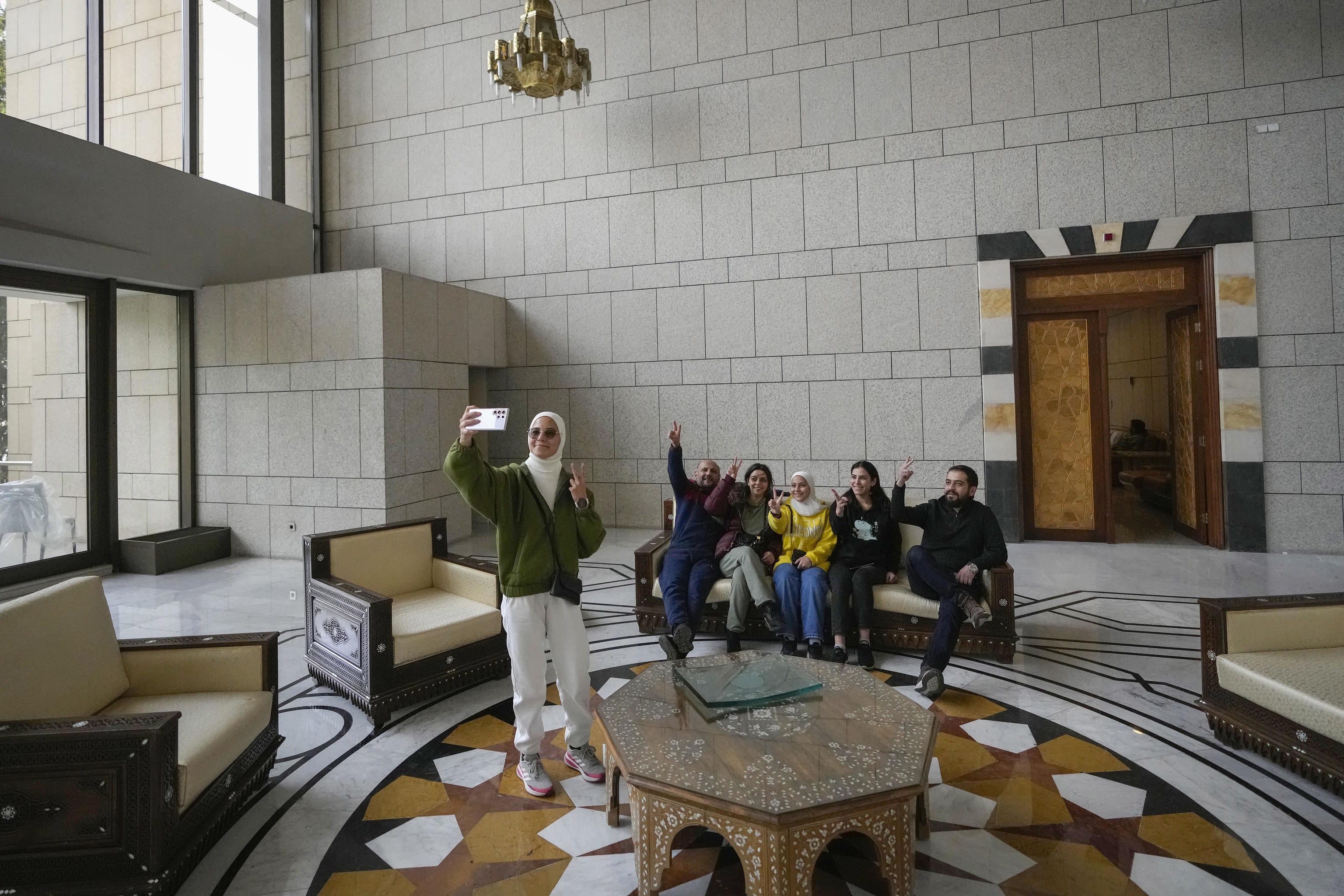Men, women, and children roamed through the rooms and climbed the stairs of the president's residence, who had fled Damascus, in the upscale neighborhood of Malki.
"I have come to seek revenge because we have been oppressed in an incredible way," said Abu Omar, 44, who refused to give his last name. "I am taking photos because I am very happy to be in the heart of his house."
The residence, consisting of three six-story buildings, had been looted before, after Damascus fell into the hands of the rebels. There were documents scattered on the stairs. A portrait of Asad lay on the floor at the entrance of the ground floor, surrounded by a vast garden with a fountain, according to journalists.
Meanwhile, at the presidential palace, two kilometers away, where President Asad received his guests, a reception hall was completely charred, according to AFP journalists.
A wave of enthusiasm for the end of the regime has taken over the streets of the capital and other major cities in the country. Thousands of people, in cars and on foot, gathered in one of the main squares of Damascus, cheering and chanting "Freedom" after half a century of rule by the Asad family, according to witnesses, after Hassan Abdul-Ghani, commander of the militant group Hayat Tahrir Al Sham -formerly an Al Qaeda affiliate- leading the insurgency declared that "the city of Damascus is free from the tyrant Bashar Asad" after over half a century of dictatorship by the Asad family, imposing terror.
Crowds have gathered in the central squares of Damascus to celebrate, chanting slogans against Asad and honking car horns. In some areas, celebratory gunfire was heard, and some gathered to pray in the city's mosques shouting "God is great."
Soldiers and police had abandoned their posts and fled, and looters stormed the Ministry of Defense headquarters, reports Ap.
Many residents of the capital could not believe the speed at which Asad's control over the country had collapsed after almost 14 years of civil war. "I didn't sleep last night and I refused to sleep until I heard the news of his fall," said Mohammed Amer Al-Oulabi, 44, who works in the electricity sector.
"From Idlib to Damascus, it only took (the opposition forces) a few days, thank God. May God bless them, heroic lions who have made us proud." "My feelings are indescribable," said Omar Daher, a 29-year-old lawyer.
"After the fear that he (Asad) and his father made us live through for many years, and the panic and state of terror in which I lived, I can't believe it. Damn his soul and that of the entire Asad family," said Ghazal al Sharif, another protester in central Damascus. "It is the prayer of all the oppressed, and God has answered it today."
Some, brimming with enthusiasm, waved the green flag representing the Syrian uprising against the Asad dynasty.
In Homs, Al Jazeera reported celebrations in its streets with hundreds of people dancing and chanting, gathered at the iconic "Clock Roundabout," in the city center, the country's third-largest city.
"Asad is gone, Homs is free" and "Long live Syria and down with Bashar al-Asad". Rebels fired into the air in celebration, and young people tore down posters of the Syrian president, whose territorial control has collapsed in a rapid army retreat lasting a week.
Syrian refugees in Beirut rejoiced on Sunday at Asad's fall, with some considering the possibility of returning to Syria, reports Ap.
"After all these years of suffering, God has granted us relief," said Hilal Youssef, a Syrian from Hama.
"We will return to Syria with pride and joy. We have rid ourselves of this army. We have rid ourselves of the injustice we lived under before and liberated Syria. Now we can go there whenever we want," said Bilal al Khleif, also from Hama. The refugees will return "to Hama, to Damascus, to Idlib, and to all areas and sing 'Freedom'," he stated.
Hundreds of Syrians took to the streets in Berlin to celebrate the fall of Bashar Asad's government. Some cheered and rejoiced in front of a Syrian bakery on Sonnenallee Boulevard in the German capital's Neukoelln district, famous for its numerous Arab shops, restaurants, and cafes.
Hundreds of thousands of Syrians fled the civil war in their home country and arrived in Germany by crossing the Mediterranean in flimsy rubber boats and trekking through the Balkans, often for days and weeks on foot.
